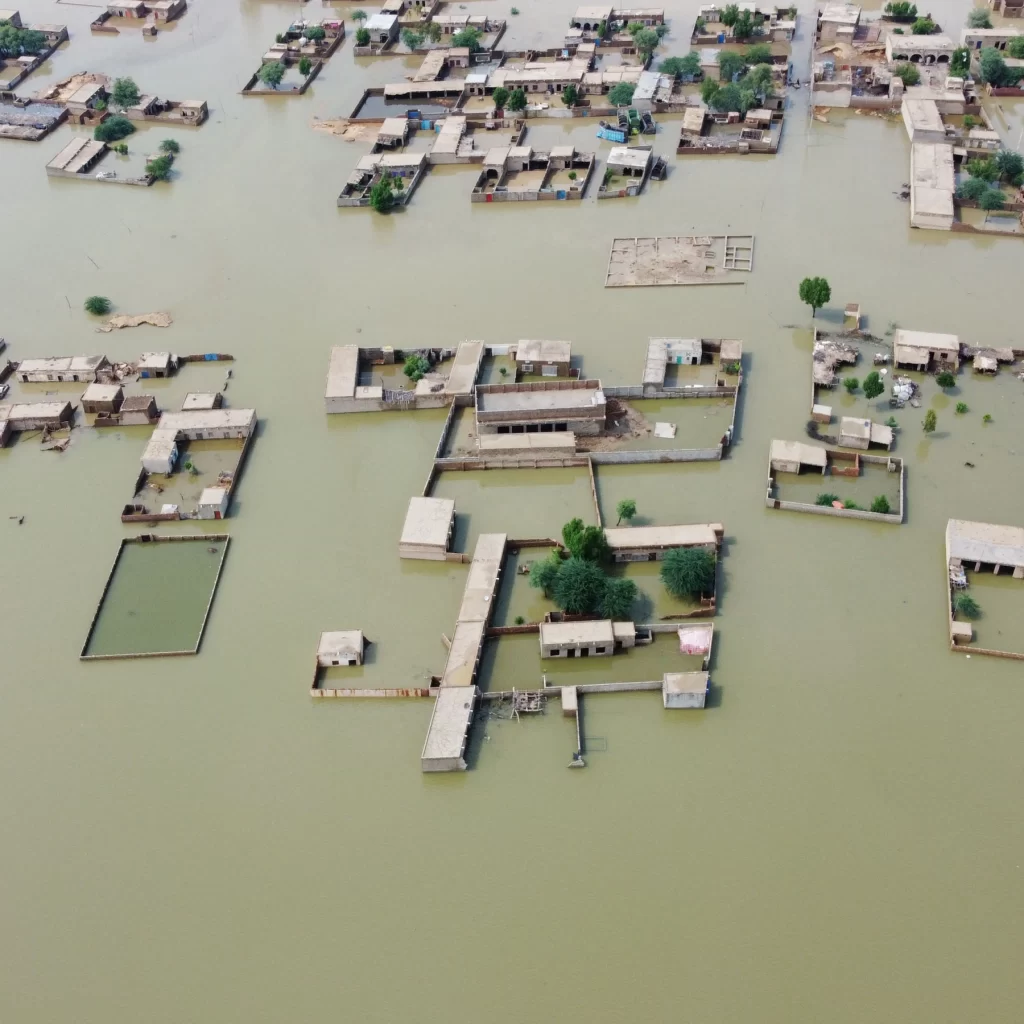Apart from the Super Floods of 2022, Pakistan has faced natural calamities one after the other since the beginning of the 21st century. The earthquake in 2005, followed by the floods of 2010 and 2014, all were high-degree natural disasters that hit Pakistan.
These natural disasters have caused a tremendous threat to Pakistan’s national security at various levels. These natural disasters create vulnerabilities for states that can cause a rise of threats from diverse natures, including threats to national security and economic challenges, and that leads to less emphasis on emerging threats, including terrorism.
Similarly, the recent devastating floods of 2022 have caused havoc and threatened Pakistan’s national security for Pakistan. A question comes to mind about how these recent Super Floods of 2022 have impacted Pakistan’s national security.
Over time, the idea of national security has changed. Many nations have attempted to integrate their defense capabilities with their economic and sociological capacities to maximize the potential for national strength.
Pakistan has devised diverse approaches to address internal security, foreign policy, defense modernization and indigenization, economic growth and development, food security, and climate change.
These measures and approaches have contributed substantially to building Pakistan’s security from threats from inside and outside. Recently, Pakistan has also formulated a National Security Policy, which articulates a citizen-centric Comprehensive National Security framework for Pakistan, whose ultimate purpose is to ensure our people’s safety, security, dignity, and prosperity.
Climate Security
With the rise of the global challenges of climate change, one of the most critical components of any country is its climate security and vulnerability. A developing country like Pakistan cannot afford to fall prey to the hazards of climate change and the connected repercussions.
According to the Pacific Northwest Laboratory, Climate security represents the physical, economic, or societal impacts associated with climate change that substantially alter political stability, human security, or national security infrastructure.
The growing climate crisis creates geopolitical and socioeconomic stressors like displacement, economic stagnation, impacts on infrastructure, and social unrest. According to the Global Risk Index Report 2021 by German Watch, Pakistan is the eighth most vulnerable country to climate change.
The severe climate change causes the earth’s temperatures to rise. This phenomenon is referred to as Global Warming. These rising temperatures cause the melting of glaciers.

There are nearly 54,000 glaciers in the Himalayas, Karakoram, and Hindu-Kush Mountain ranges collectively, according to International Centre for Integrated Mountain Development (ICIMOD).
Out of these 54,000 glaciers, more than 7000 exist in Pakistan. So, when these glaciers melt, rivers get flooded and cause a natural disaster. According to European Space Agency (ESA), the super floods of 2022 submerged one-third of Pakistan in water.

Also, due to climate change, the river water is reduced, and water management is adversely affected. So, the climate security of Pakistan is at elevated risk and threatens its national security.
Economic Security
Another notable element related to a country’s national security is its economic security. Property losses in Pakistan always occur due to natural calamities and repairing that damaged property causes economic instability.
The earthquake that struck AJK and eastern NWFP on the morning of October 8, 2005, left widespread destruction, killing at least 80,000 people, severely injuring another 38,000, and leaving more than 3 million people without shelter, according to a report by Earthquake Engineering Research Institute (EERI).
Also Read: Pakistan’s Climate Vulnerability and Super Floods of 2022
Earthquake of 2005 caused massive economic loss, and the total cost associated with the earthquake was estimated at $5.2 billion, according to a report by Asian Development Bank and World Bank.
While on the other hand, the recent floods have been described as the worst in the country’s history and made an irreparable loss of at least $10 billion to repair damaged infrastructure.
Economic losses in the Floods of 2010 and 2014
The floods of 2010 that hit the KPK, Sindh, lower Punjab, and Balochistan regions also caused massive economic losses.
According to the Finance division of the Government of Pakistan, the total reconstruction cost of the 2010 floods was Rs. 578 billion, and the estimated cost of the recovery effort of the 2014 floods was $439.7 million.
So, it is evident that the economy is severely affected every time a natural calamity hits Pakistan. Any damage to the economic security weakens the national security of Pakistan. The 2022 Super Floods will also affect the economy badly and threaten national security.
Floods have also threatened the food security of Pakistan. According to USAID, food security means having, at all times, both physical and economic access to sufficient food to meet dietary needs for a productive and healthy life.
Due to recent floods, many people have lost their crops and livestock and are facing food insecurity.
The loss of rice production of 1,892,172 metric tons, the loss of cotton production of 3,106,709 bales, and the loss of sugarcane production of 10,486,793 occurred in Sindh alone, according to a report by the ICIMOD on the assessment of crop losses in Sindh using satellite data.
Impact on Human Security
Another crucial factor that occurs due to a natural calamity and threatens national security is human insecurity. Natural disasters cause human insecurity in diverse ways. The 2010 floods raised many new human security challenges for Pakistan.
Waterborne diseases, such as diarrhea and respiratory infections, caused havoc among the affected people. Moreover, drinking water was also declared unfit for use.
The recent floods have also spread many waterborne diseases, and many people, especially children, are at high risk.

Women are massively affected when floods occur as their menstrual hygiene is always compromised. People mainly do not focus on this matter because other issues like food and water insecurities are considered of prime importance. Many women faced several issues regarding menstrual hygiene during the 2022 super floods.
Conclusion
A country’s national security depends on climate, economic, food, and human security. If either of them is challenged, then national security is threatened.
A developing country like Pakistan cannot afford its national security to be compromised. Pakistan is facing almost all concerns regarding national security due to the 2022 floods.
To cope with these challenges, proper mechanisms should be made. Pakistan should either make mechanisms for climate change adaptation or spread awareness regarding climate change and its detrimental consequences.
Alongside this, proper steps must be taken to preserve human security, including food and water security factors.
The international community should play its role in helping Pakistan and the people of Pakistan who suffered the loss of lives and infrastructure, which may take another lifetime to rebuild. The global polluting nations should pay Pakistan for their heavy use of fossil fuels, hence creating threats for developing countries like Pakistan.
Nearly 1,600 were killed, several million displaced, and the cash-strapped government estimates losses in the region of $30 billion. This “loss and damage” payment should come from the international polluters and companies capitalizing and profiting from the businesses.
*The writer is a Fellow at The Diplomatic Insight, published by the Institute of Peace and Diplomatic Studies
**The views expressed here in this article are writer’s own and do not necessarily reflect the position of the institutions or staff.
Student of BS-International Relations at Quaid-i-Azam University
- This author does not have any more posts.








